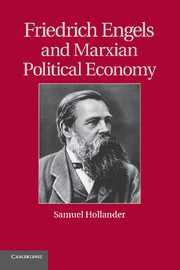Book contents
- Frontmatter
- Contents
- Preface
- Prolegomena
- 1 Engels's Early Contribution
- 2 The Surplus-Value Doctrine, Rodbertus's Charge of Plagiarism, and the Transformation
- 3 Economic Organization, and the Price Mechanism
- 4 “Revisionism” I. Constitutional Reform versus Revolution
- 5 “Revisionism” II. Social Reform
- 6 The Engels–Marx Relation
- 7 A Methodological Overview
- Epilogue: The Immediate Legacy
- Appendix A Prolegomena: A Brief Chronology
- Appendix B Chapter 5
- Appendix C Chapter 7
- Bibliography of Works Cited
- Index
- Titles in the series
Appendix C - Chapter 7
Published online by Cambridge University Press: 01 June 2011
- Frontmatter
- Contents
- Preface
- Prolegomena
- 1 Engels's Early Contribution
- 2 The Surplus-Value Doctrine, Rodbertus's Charge of Plagiarism, and the Transformation
- 3 Economic Organization, and the Price Mechanism
- 4 “Revisionism” I. Constitutional Reform versus Revolution
- 5 “Revisionism” II. Social Reform
- 6 The Engels–Marx Relation
- 7 A Methodological Overview
- Epilogue: The Immediate Legacy
- Appendix A Prolegomena: A Brief Chronology
- Appendix B Chapter 5
- Appendix C Chapter 7
- Bibliography of Works Cited
- Index
- Titles in the series
Summary
Marx and Engels on an Alternative Russian Option
Of high interest in the light of Engels's “unavoidable developmental path” or Marx's “tendencies working with iron necessity towards inevitable results” are prospects for a transition to communism in Russia based upon the peasant commune (the obshchina), rather than upon capitalist development. The possibility that Russia might achieve communism without passing through a capitalist stage has been attributed to Marx (see, e.g., Howard and King 1989: 138; also 1985: 233). This attribution is based in part on a letter of 1877 (responding to a critical review of Capital) opining that “if Russia continues along the path it has followed since 1861” – an allusion to incipient capitalistic progress – “it will miss the finest chance that history has offered to a nation, only to undergo all the fatal vicissitude of a capitalist system” (“Letter to Otechestvenniye Zapiski”; MECW 24: 199). By implication, the “finest chance” relates to the commune option, and this is how it has often been understood in the literature. This remark is actually crossed out in Marx's manuscript (199n.), and it is not clear why or by whom; however, what follows immediately makes much the same point. Thus Marx points out that his Chapter 26 (“The Secret of Primitive Accumulation”) concerned specifically Western European experience, and it had concluded in the following terms:
In the history of primitive accumulation, all revolutions are epoch-making that act as levers for the capitalist class in course of formation; but, above all, those moments when great masses of men are suddenly and forcibly torn from their means of subsistence, and hurled as free and “unattached” proletarians on the labour market. […]
- Type
- Chapter
- Information
- Friedrich Engels and Marxian Political Economy , pp. 368 - 372Publisher: Cambridge University PressPrint publication year: 2011



